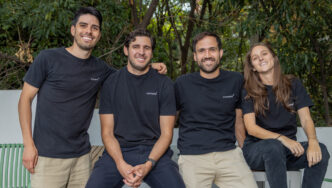Tumoni, a Nicaraguan startup focused on providing banking and remittance services for Central American migrants, announced today that it has raised $2.29 million dollars in a pre-seed round co-led by Slauson & Co. and Counterview Capital. Seedstars International Ventures, NuMundo Ventures, Caricaco, Hatcher, Plug and Play, and angel investors, including former Visa senior executive Uttam Nayak, also participated.
The Central American fintech’s main objectives are to address the lack of accessible banking services for Central American migrants in the United States and the high costs associated with sending remittances to their home countries by offering free cross-border transfers.
Tumoni’s platform allows users to open a domestic bank account in just 10 minutes, obtain a debit card, and send and receive free cross-border transfers. The application also facilitates mobile top-up and bill payments, both domestic and international.
The fresh capital will be used to launch Tumoni’s product in the U.S. and Nicaragua, with plans to expand to Guatemala, El Salvador, Honduras and other Central American and Caribbean countries in the near future, according to a statement. The company aims to reach at least 50,000 active users by the end of 2025 and diversify its offering to include more value-added services.
Tumoni is positioning itself to disrupt the $45 billion annual remittance corridor between the U.S. and Central America, currently dominated by traditional cash-based providers.
“At the current rate of innovation, it will take us two decades to reach the UN goal of reducing the cost of remittances to less than 3% in this corridor. We will achieve 0% by 2024,” said Paolo Delaunay, CEO and co-founder of Tumoni in a statement. “Most remittance companies take advantage of the fact that people are unbanked. This is a market inefficiency that needs to be solved, not exploited,” adds Delaunay.
Central America remains the least banked region in the Americas, with less than 20% of the population actually having access to banking services and participating in the digital economy. Traditional financial institutions have struggled to effectively serve this demographic, both in their home countries and in the United States, where many migrants face barriers to opening bank accounts due to their immigration status.
“To accelerate financial inclusion, products must be developed with the real needs of users in mind. For 60 million Central Americans, the number one priority is remittances,” Delaunay explained.
Tumoni’s solution targets approximately 60 million Central Americans and members of their diaspora who are currently underserved by traditional financial institutions. By focusing on remittances, the primary financial touch point for many members of this community, Tumoni aims to create a gateway to broader financial inclusion.





